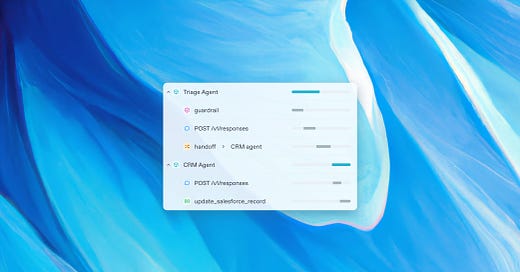OpenAI's New SDK Makes Building Enterprise AI Agents More Accessible
Coinbase and Box among early adopters as OpenAI shifts toward community-driven innovation.
OpenAI has released a new open-source Agents Software Development Kit (SDK) designed to help developers build, manage, and optimize AI agent workflows for enterprise applications. The announcement, made last week, marks a significant strategic shift for the company toward community collaboration and positions OpenAI as a central player in the emerging field of autonomous AI systems.
The new toolkit addresses one of the biggest challenges facing enterprise AI adoption: the complexity of building reliable, production-ready AI agents. Previously, developers needed extensive prompt engineering skills and custom orchestration logic to create effective agent-based systems, often with limited visibility into how they functioned.
"It's hard to overstate how critical reasoning models are for enabling AI agents. One of the biggest limitations before was handling long-horizon tasks like planning," said Olivier Godement, head of product for OpenAI's platform.
The Agents SDK provides a framework for creating "useful and reliable agents" – defined by OpenAI as "systems that independently accomplish tasks on behalf of users." It works alongside OpenAI's newly announced Responses API and supports multiple models, including those from competitors.
"The Agent SDK is open-source, allowing enterprises to mix and match different models. We don't want to force anyone to use only OpenAI models," Godement explained, highlighting the company's commitment to flexibility.
Key Features and Capabilities
The toolkit offers several key features that streamline the development process. Developers can create configurable agents with predefined instructions and specific tool access, implement intelligent handoffs between agents based on task context, and utilize built-in guardrails for safety and content moderation. The SDK also includes tracing and observability tools for debugging and performance optimization.
"With the Agents SDK, developers can track exactly what an agent is doing — what tasks it spawns, what data it gathers and how it generates responses," said Nikunj Handa, product manager on OpenAI's API team.
Here are some of the SDK features, as described by OpenAI:
The new Responses API, combining the simplicity of the Chat Completions API with the tool use capabilities of the Assistants API for building agents
Built-in tools including web search, file search, and computer use
The new Agents SDK to orchestrate single-agent and multi-agent workflows **
These new tools streamline core agent logic, orchestration, and interactions, making it significantly easier for developers to get started with building agents. Over the coming weeks and months, we plan to release additional tools and capabilities to further simplify and accelerate building agentic applications on our platform.
Early Adopters Show Promise
Several companies have already begun implementing the SDK in their operations. Coinbase used it to rapidly prototype and deploy AgentKit, a toolkit enabling AI agents to interact with crypto wallets and on-chain activities. They were able to integrate custom actions from their Developer Platform SDK and create a functional agent within hours.
Box has also utilized the Agents SDK in combination with web search capabilities to create agents that allow enterprises to search, query, and extract insights from unstructured data stored within Box and public internet sources. This integration enables users to access the latest information while respecting security policies and permissions.
Strategic Implications
The open-source approach represents a strategic pivot for OpenAI, acknowledging that community contributions are essential to improving agent reliability. "The lesson is clear: OpenAI needs the community's innovation to improve reliability," wrote Matt Marshall in VentureBeat, referencing the emergence of platforms like Manus that have pushed innovation in the agent space.
This move positions OpenAI in direct competition with existing agent framework providers such as LangChain and CrewAI, potentially leading to consolidation in the agent framework space. However, the SDK's support for non-OpenAI models may mitigate concerns about vendor lock-in while still positioning OpenAI at the center of the agent ecosystem through its API standards.
The SDK is particularly powerful when used with OpenAI's built-in tools available through the Responses API, including web search, file search, and computer use capabilities. The computer use tool, currently available as a research preview for select developers, enables models to "interact with graphical user interfaces when there's no existing API for a task.”.
Looking Ahead
OpenAI views these releases as just the beginning of a comprehensive platform for AI agents. "We think the coming months are going to be critical for deploying more and more agents at scale," stated Godement, indicating plans to roll out additional tools and integrations for deployment, evaluation, and scaling.
For enterprises considering adoption, the SDK offers several advantages: reduced need for extensive prompt engineering, improved visibility into agent operations, standardization of the development process, and support for multiple models. However, challenges remain around reliability, with human oversight still recommended in some scenarios.
As AI agents become increasingly central to enterprise automation strategies, OpenAI's Agents SDK represents a decisive move to shape the future of business AI applications by providing the tools needed to build more sophisticated and reliable autonomous systems.
I'll be experimenting with the SDK across various business and technical use cases and will share my findings in future posts. So, stay tuned for updates.
Keep a lookout for the next edition of AI Uncovered!
Follow our social channels for more AI-related content: LinkedIn; Twitter (X); Bluesky; Threads; and Instagram.




